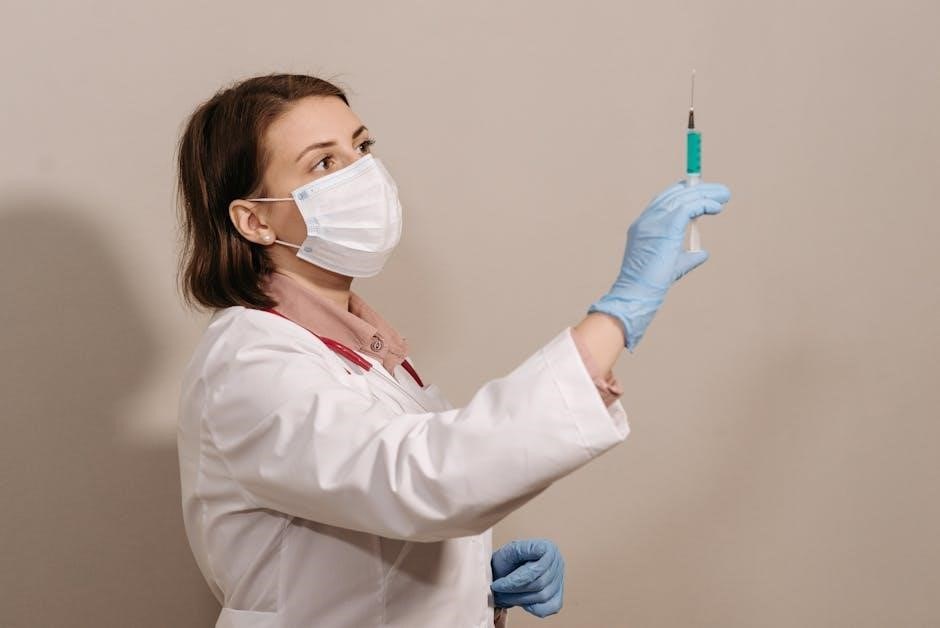This section introduces the fundamental principles of pharmacology and its integration into nursing practice, emphasizing the importance of understanding drug mechanisms, safe administration, and patient-centered care in clinical settings.
Overview of Pharmacology and Nursing
Pharmacology is the scientific study of drug actions and effects on living organisms, playing a vital role in healthcare. Nursing integrates pharmacology to ensure safe and effective medication administration. Nurses use pharmacology principles to assess patients, diagnose needs, plan care, implement interventions, and evaluate outcomes. Understanding drug mechanisms, dosages, and potential interactions is crucial for preventing errors and improving patient care. This interdisciplinary approach ensures that pharmacology is applied practically in nursing to enhance patient well-being and safety.

Key Features of the 10th Edition
The 10th edition offers practical pharmacology information, emphasizing the nursing process, with updated content, interactive tools, and a focus on safe medication administration and patient care.
Updates and Enhancements in the 10th Edition
The 10th edition features updated pharmacology content, emphasizing the nursing process and safe medication administration. New chapters and case studies highlight current trends and patient-centered care. Enhanced digital tools, including interactive exercises and Evolve resources, support deeper learning. The edition also includes revised test banks and study materials to aid nursing students in mastering pharmacology concepts effectively.
Focus on the Nursing Process
The 10th edition emphasizes the nursing process, integrating pharmacology into patient care through assessment, diagnosis, planning, implementation, and evaluation. This approach ensures medications are administered safely and effectively, promoting optimal patient outcomes. Practical examples and case studies illustrate how pharmacology aligns with nursing care, helping students apply theoretical knowledge in real-world scenarios. The focus on individualized care and evidence-based practices prepares nurses to deliver high-quality, patient-centered care.

Integration of Pharmacology into the Nursing Process
Pharmacology is seamlessly integrated into the nursing process, ensuring safe medication administration and effective patient care through assessment, planning, and evaluation of drug therapies and patient responses.
Assessment, Diagnosis, Planning, Implementation, and Evaluation
Pharmacology integrates into the nursing process through assessment, identifying patient needs and drug responses. Diagnosis focuses on actual or potential drug-related issues. Planning involves developing personalized care plans. Implementation includes administering medications and educating patients. Evaluation monitors outcomes, ensuring safe and effective therapy. This structured approach enhances patient care, aligning pharmacological interventions with nursing standards for optimal health outcomes.
Application of Pharmacology in Patient Care
Pharmacology is central to patient care, guiding nurses in medication administration, disease management, and symptom relief. Nurses apply pharmacological knowledge to develop tailored care plans, monitor drug responses, and educate patients on safe use. This application ensures therapeutic effectiveness, minimizes adverse effects, and enhances overall health outcomes, aligning with evidence-based practices for individualized patient care.

How to Access the 10th Edition PDF for Free
Access the 10th Edition PDF by visiting legitimate educational platforms or official publishers. Ensure compliance with copyright laws when downloading or sharing academic materials.
Legitimate Sources for Downloading the PDF
To access the 10th Edition PDF legally, consider using university libraries, educational platforms, or official publishers. Many institutions provide access to digital textbooks through their databases. Additionally, some online repositories offer free downloads for educational purposes. Always verify the authenticity of the source to ensure compliance with copyright laws and avoid unauthorized distribution. Prioritizing legitimate sources helps maintain academic integrity and supports the creators of educational content;
Importance of Using Licensed Educational Resources
Using licensed educational resources ensures compliance with copyright laws and supports the creators of academic content. It promotes academic integrity by providing access to authentic, high-quality materials. Licensed resources often include updates, ensuring the most current information is available. This practice also helps avoid legal consequences associated with unauthorized downloads. By prioritizing licensed materials, users contribute to the sustainability of educational publishing and maintain ethical standards in their academic pursuits.

Test Bank and Study Materials
The 10th Edition offers a comprehensive test bank with chapters 1-58, providing students with extensive study resources to master pharmacology concepts and prepare for exams effectively.
Test Bank for Pharmacology and the Nursing Process 10th Edition
The 10th Edition test bank provides a comprehensive study resource, covering chapters 1-58 with detailed questions and answers. It is designed to help nursing students master pharmacology concepts and prepare for exams like the NCLEX. Available as a PDF, this test bank offers a structured approach to learning, focusing on the application of the nursing process and safe medication administration. Students can access it through legitimate educational platforms or Evolve Resources for enhanced learning.
Additional Study Resources and Tools
Beyond the test bank, students can access supplementary materials like full chapter downloads, interactive tools, and online resources. These tools enhance understanding of pharmacology and the nursing process, offering practical insights for patient care. Available through platforms like Evolve, these resources support visual and hands-on learning, ensuring a well-rounded educational experience for nursing professionals. They complement the 10th Edition PDF, providing a comprehensive study framework for success in pharmacology and nursing practice.
Evolve Resources for the 10th Edition
The 10th edition provides supplementary materials through Evolve, including interactive tools, additional chapters, and study aids to enhance learning and understanding of pharmacology and nursing concepts.
Supplementary Materials for Enhanced Learning
The 10th edition offers a range of supplementary materials through Evolve, designed to enhance learning and retention. These include interactive modules, additional chapters, and study aids that complement the textbook. Students can access NCLEX-style practice questions, case studies, and video tutorials to deepen their understanding of pharmacology concepts. These resources provide a comprehensive learning experience, helping students apply theoretical knowledge to real-world patient care scenarios and prepare effectively for exams and clinical practice.
Interactive Tools for Nursing Students
The 10th edition provides interactive tools designed to engage nursing students and enhance their learning experience. Evolve resources include interactive modules, practice questions, and case studies that simulate real-world scenarios. Students can access video tutorials and animations to visualize complex pharmacological concepts. These tools help reinforce key concepts, improve critical thinking, and prepare students for clinical practice. They also offer a flexible learning environment, allowing students to study at their own pace and review challenging topics as needed.
Safe Medication Administration
This section emphasizes the role of pharmacology in ensuring safe drug administration, focusing on the nursing process to minimize errors and enhance patient safety.
Role of Pharmacology in Safe Patient Care
Pharmacology plays a crucial role in safe patient care by providing nurses with the knowledge to administer medications effectively. Understanding drug mechanisms, dosages, and interactions is essential for preventing errors and ensuring therapeutic outcomes. Nurses use pharmacology principles to assess patients, monitor responses, and educate them on proper drug use. This application minimizes adverse effects and enhances patient safety, making pharmacology a cornerstone of nursing practice.
Nursing Strategies to Minimize Medication Errors
Nurses can minimize medication errors by adhering to the five rights: right patient, drug, dose, route, and time. Double-checking orders, using barcode scanning, and maintaining accurate records are critical. Patient education, clear communication with healthcare teams, and reporting near misses also contribute to safety. Regular training and staying updated on pharmacology guidelines further enhance error prevention, ensuring safe and effective care.

Benefits of the 10th Edition for Nursing Students
The 10th edition offers practical pharmacology information, application-focused content, and enhanced learning tools, helping nursing students grasp drug therapy and its integration into patient care effectively.
Practical Pharmacology Information
The 10th edition provides clear, concise pharmacology content tailored for nursing practice, emphasizing drug classifications, dosage calculations, and patient-specific considerations. It includes detailed drug monographs, side effect profiles, and nursing implications, ensuring students can apply pharmacological knowledge safely and effectively in real-world scenarios. The text also incorporates case studies and clinical examples to bridge theory and practice, making it an invaluable resource for understanding drug therapy and its impact on patient care.
Application-Focused Content
The 10th edition emphasizes real-world application, with content structured to help nursing students understand how pharmacology integrates into patient care. It includes case studies, clinical examples, and practical scenarios that highlight drug therapy in diverse patient populations. The text focuses on applying the nursing process to pharmacological interventions, ensuring students can translate knowledge into effective patient care. This approach reinforces critical thinking and decision-making skills essential for safe and effective medication management in clinical practice.

Importance of Pharmacology in Nursing Practice
Pharmacology is essential for safe medication administration, understanding drug mechanisms, and optimizing therapeutic effects, forming the foundation of high-quality patient care in nursing practice.
Understanding Drug Mechanisms and Effects
Understanding how drugs interact with the body is crucial for effective patient care. Pharmacology explains drug mechanisms, such as absorption, distribution, metabolism, and excretion, and their therapeutic and adverse effects. This knowledge helps nurses predict drug responses, prevent toxicity, and optimize dosing regimens. By grasping pharmacokinetics and pharmacodynamics, nurses can tailor medications to individual patient needs, ensuring safe and effective outcomes. This foundation is vital for applying pharmacology in clinical practice and improving patient care. The 10th edition emphasizes these principles, linking theory to real-world applications.
Pharmacology as the Foundation of Nursing Care
Pharmacology serves as the cornerstone of nursing care, providing essential knowledge on drug actions, administration, and therapeutic effects. Nurses rely on pharmacology to design personalized treatment plans, monitor drug responses, and educate patients. This expertise ensures safe medication administration, minimizes adverse effects, and enhances patient outcomes. By understanding pharmacological principles, nurses deliver high-quality, evidence-based care, making pharmacology a vital foundation in their practice.
